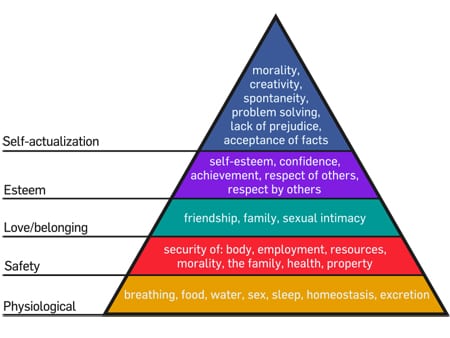Download Episode Here – right click link and select “Save Link As…”
In this episode, Joel and Antonia talk about why people tend to fight about sex, money, and relationships, and how using the Maslow Hierarchy of Needs model can help resolve conflict.
In this podcast you’ll find:
- Disagreements and fights commonly occur within relationships. Counselors and relationship experts often tell you that people fight about sex, money and family issues. Why is it that this is a recurring issue among couples? What are the solutions?
- Abraham Maslow’s hierarchy of Needs is a lifelong achieve to go from the bottom to the top tier. These are our fundamental human needs and we come in and out them from time to time. These needs are not fixed nor constant.
- There 5 different levels in the pyramid.
- The bottom level is the “survival level” or the physiological needs – food, shelter, sex. Once this is established, we graduate to safety and security needs.
- Safety and security needs – the feeling of being safe like financial security, health and wellness.
- Love and belongingness– being romantically accepted, emotional needs are taken cared of.
- Self Esteem – when we want to accomplish something that’s bigger, something that contributes to ourselves and other people.
- Self-Actualization –happens when we feel good spiritually, we feel like we’re more than just the sum of our parts. We have a lot of abundance in resource and we feel that we can give back without feeling like it’s costing us anything.
- Most of the common issues that couples fight are in the first three tiers.
- Money issues are huge and is a safety and security need. Whatever the issue is, it all comes down to blaming your partner about and not realizing that there’s a need going unmet.
- Donkey Smuggling – Smuggled emotions happen because people feel unsafe. You can remove the blame game by asking “Which need is unmet”.
- Example – if you haven’t eaten for the entire day, your mood will be affected which increases the risk of you diverting (blaming) your mood towards your partner (other people).
- Understanding the model (Maslow’s Hierarchy of Needs) helps anybody understand and look at the problems and not the person.
- Getting your needs met is the way to give back to other people.
- Talk about your partner and try to ask which needs are unmet
- Get each other’s back as a couple. Support each other by fulfilling each other’s needs.
- How can we manage our feelings as individuals so that we don’t feel unsafe?
- Relationships do well when needs are met.
- When you and your mate are in a tense discussion, think about relationships in getting needs met.
Exercises we recommend in this podcast:
- Write on a sticky note “Which need is going unmet?” Constantly ask yourself this question.
To subscribe to the podcast, please use the links below:
Subscribe with iTunes
Non iTunes Link
Download The Android App
Subscribe on Soundcloud
Subscribe with Stitcher
If you like the podcast and want to help us out in return, please leave an honest rating and review on iTunes by clicking here. It will help the show and its ranking in iTunes immensely! We would be eternally grateful!
Want to learn more?
Discover Your Personal Genius
We want to hear from you. Leave your comments below…




Share:
Podcast - Episode 0053 - Imago Relationships
Podcast - Episode 0055 - INFP Personality Type Advice
5 comments
Mica, be confident, some women do love INFJ, I’m an ENTP and my mate is an INFJ, and it took me years to settle with somebody. We’ve long discussed what we both love in each other and it’s very clear how much we have in common, and how much we complement each other. It might be more difficult to find but the treasure in the end is … waoooo <3
Hi Antonia and Joel. Thanks for your podcast. Have been listening to it since one week reaching this 54 one. I’d love to translate each one of them in French (for being French and wanting to share it here). I’m taking this opportunity to thank you both. And I want to thank you Antonia for your sharing your intimate life, fight, personal emotion and path in this podcast. I’m probably an ENTP though very close to INTP, and I experience similar situations of fight for unmet needs. Expressing the vacuum the same way as you do. Well I mean I identify totally with your describing of the situation. Thanks for the light and the generosity of sharing it.
Marine
Are those needs the motivation behind human behaviours? I’m confused because i also hear about the power-affiliation-achivement model. Is the power-affiliation-achivement a simplification of the Maslow hierarchy of needs?
BTW great podcast!
Thanks Micah for the comment.
That sounds like a great idea for a podcast.
During one of our events (can’t remember which now) we break down the numbers of Intuitives in the world.
It seems to really resonate with people… so we should probably do a podcast on it in the near future.
I love this podcast. Keep up the good work!
I have a suggestion for a podcast topic you guys could address (forgive if has been already). I would like you guys to talk about people who may be at a disadvantage when it comes to finding a compatible mate in terms of their personality, disposition, etc. For example, I am an INFP guy and I find that most women are not what I am looking for in a mate. According to Keirsey my ideal type is ENTJ, which is a very rare type among women (I happen to like strong, dominant women). I believe everyone has a number of compatible individuals out there that do not reflect typical personality matches, but it seems like some people find mates easier than others. This might be due to a relatively low number of potentials (my ENTJ example), not following the typical norm (I’m not big on pursuing, which sucks as a guy), or a number of other factors.
If you guys could address this either to me directly or in the form of a podcast/article, that would be great!